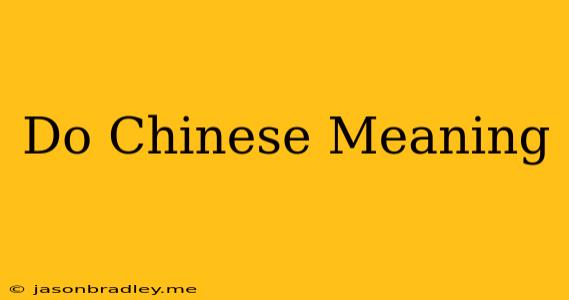What Does "Do" Mean in Chinese?
While English uses the verb "do" for a wide range of actions, Chinese has different verbs depending on the specific action you want to express. There's no single Chinese word that directly translates to "do" in its entirety.
Here's a breakdown of how to express "do" in Chinese:
1. 做 (zuò)
- Most Common: "Zuò" is the most common verb used to express "do" in Chinese. It can cover a broad range of activities, similar to the English "do."
- Examples:
- 做饭 (zuòfàn): To cook
- 做作业 (zuò zuòyè): To do homework
- 做生意 (zuò shēngyi): To do business
- 做朋友 (zuò péngyou): To be friends
2. Other Verbs for Specific Actions:
Depending on the context, other verbs might be more appropriate than "zuò" to express "do":
- 学习 (xuéxí): To learn (e.g., 学习汉语 (xuéxí hànyǔ) - to learn Chinese)
- 工作 (gōngzuò): To work (e.g., 我现在在工作 (wǒ xiànzài zài gōngzuò) - I am working now)
- 玩 (wán): To play (e.g., 我喜欢玩游戏 (wǒ xǐhuan wán yóuxì) - I like to play games)
- 看 (kàn): To watch, read, or look (e.g., 我正在看电视 (wǒ zhèngzài kàn diànshì) - I'm watching TV)
3. Using "做" with an Object:
Often, you can use "zuò" with an object to express a specific action:
- 做饭 (zuòfàn): To cook food
- 做作业 (zuò zuòyè): To do homework
- 做运动 (zuò yùndòng): To do exercise
4. Context is Key:
The specific Chinese word you choose to express "do" will depend on the context and the action you are referring to. Pay attention to the specific action and choose the verb that best reflects it.
5. Using "Do" in Questions:
The Chinese equivalent of "do" in questions is "吗 (ma)" which is added to the end of a sentence.
- 你做作业了吗? (nǐ zuò zuòyè le ma?) Did you do your homework?
- 你吃了吗? (nǐ chī le ma?) Have you eaten?
Conclusion:
There's no single direct translation of "do" in Chinese. By understanding the different verbs and their usage, you can effectively express a wide range of actions and activities in Chinese. Pay attention to the context and choose the most appropriate verb for your specific situation.
